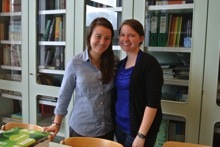Thank you!
Thank you for agreeing to work with a student teacher from Miami University. We know that you have much expertise and many experiences to share with our interns, and we greatly appreciate your willingness to open your classroom to our next generation of teachers.
Sincerely,
Dr. Jean F. Eagle
Director of Clinical Field Experiences
& School Partnerships
Miami University
Oxford, Ohio USA
eaglej@miamioh.edu
(513) 529-7245
Conceptual Framework
The School of Education, Health and Society is a community of collaborative practitioners who are committed to fulfilling Miami University’s mission to prepare caring, competent, and transformative educators by infusing skills, knowledge, and dispositions that promote the highest caliber professional programs in the areas of education, health, and society.
Responsibilities of the Cooperating Teacher
1. Prepare the class for the student teacher, encouraging students’ cooperation and support so that the student teacher can practice in a friendly environment.
2. Arrange an introductory meeting with the school principal for the student teacher.
3. Encourage the student teacher to develop lessons that enrich the course curriculum and stimulate new ideas. Assist the student teacher in planning lessons that challenge students.
4. Read and critique the student teacher’s lesson plans at least one day prior to scheduled delivery of the lesson.
5. Allow and encourage the student teacher, under your guidance, to practice teaching, management, and strategy styles that fit his/her personality and preferences even if they differ from your own.
6. Share professional ideas and resources with your student teacher.
7. Submit a Letter of Recommendation via email to the Office of Student Teaching (benesjl@miamioh.edu) during the last week of the placement. This letter should describe the context of the school and classroom, curricula used, strengths and progress of the student teacher, and any special projects or activities that took place during the 8 week experience.
8. Work in conjunction with the university. University supervisors serve as a liaison between the student teacher, cooperating teacher, and the university. The supervisor makes site visits, arranges formal observations, schedules conferences with the student and cooperating teacher, and is available, either in person, or electronically to address the needs of the student teacher. Feedback from formal observations should be used in a constructive manner; it is vital to the growth and success of the student teacher. Please contact the university supervisor immediately in the event of any unforeseen circumstance or problem that relates to the student teacher.
Important Initial Information
Upon the student teacher’s arrival in your classroom, please discuss the following:
- Personal philosophy and professional perspective
- Information about students in the class
- Overall objectives and curriculum guidelines
- Lesson plans and the student teacher’s role in planning
- Standards for grading student work and grading timelines
- Routines and procedures, including emergency procedures, for the class and building
- School meetings and assemblies
- Communicating with parents
- School calendar
- Daily duties and responsibilities
- Supplies and work areas
- Personal property and security
- Introductions to other faculty and staff
Co-Planning & Co-Teaching
Miami student teachers engage in several field experiences prior to arriving in Europe, and should be considered prepared to co-teach from their first day in the classroom. Please meet with your student teacher and develop an individualized plan that best meets the needs of your learners. Under the supervision of the cooperating teacher, student teachers should increasingly take on more responsibilities including recess supervision, study hall, or lunch duty. Student teachers are strongly encouraged to enrich their overall understanding of classroom learners and their culture through volunteer experiences such as tutoring, mentoring or coaching.
Lesson planning is a mandatory element of student teaching. Student teachers must prepare complete lesson plans for every lesson they teach or are responsible for in the Europe. These should be available for the university supervisor to review at each observation. Lesson plans are a working document; after a lesson is taught they should be used for reflection, notes, and ideas for improving the lesson. There is a lesson plan template in the Student Teacher Handbook for reference. Formats may vary, but should include the following: the academic standards, anticipatory set, activities, materials and resources, accommodations for special learners, assessment (formal or informal) and reflection.
Attendance Policy for Student Teachers
Student teachers are required to be on time every day of the student teaching experience and are expected to stay at school during the hours required of a regular classroom teacher. A student teacher who must miss a day due to illness or another severe issue is required to inform their cooperating teacher and university supervisor prior to the absence. Students who miss more than five days will be required to make up the days or repeat the student teaching experience upon return to the United States. Two tardy incidents or early departures will equal one day’s absence. Any unexcused absence is cause for removal from the student teaching placement.
UNDER NO CIRCUMSTANCES SHOULD A STUDENT TEACHER ACT AS A SUBSTITUTE TEACHER. If the cooperating teacher is absent, a licensed substitute must be in the room with the student teacher. The student teacher can, and should, continue regular teaching while the teacher is absent, thus maintaining regular standards of learning and classroom management.
Student teachers in Europe must follow the calendar of their host school for the duration of their placement. Please note that students will be expected in school during US holidays that are not observed in Europe.


